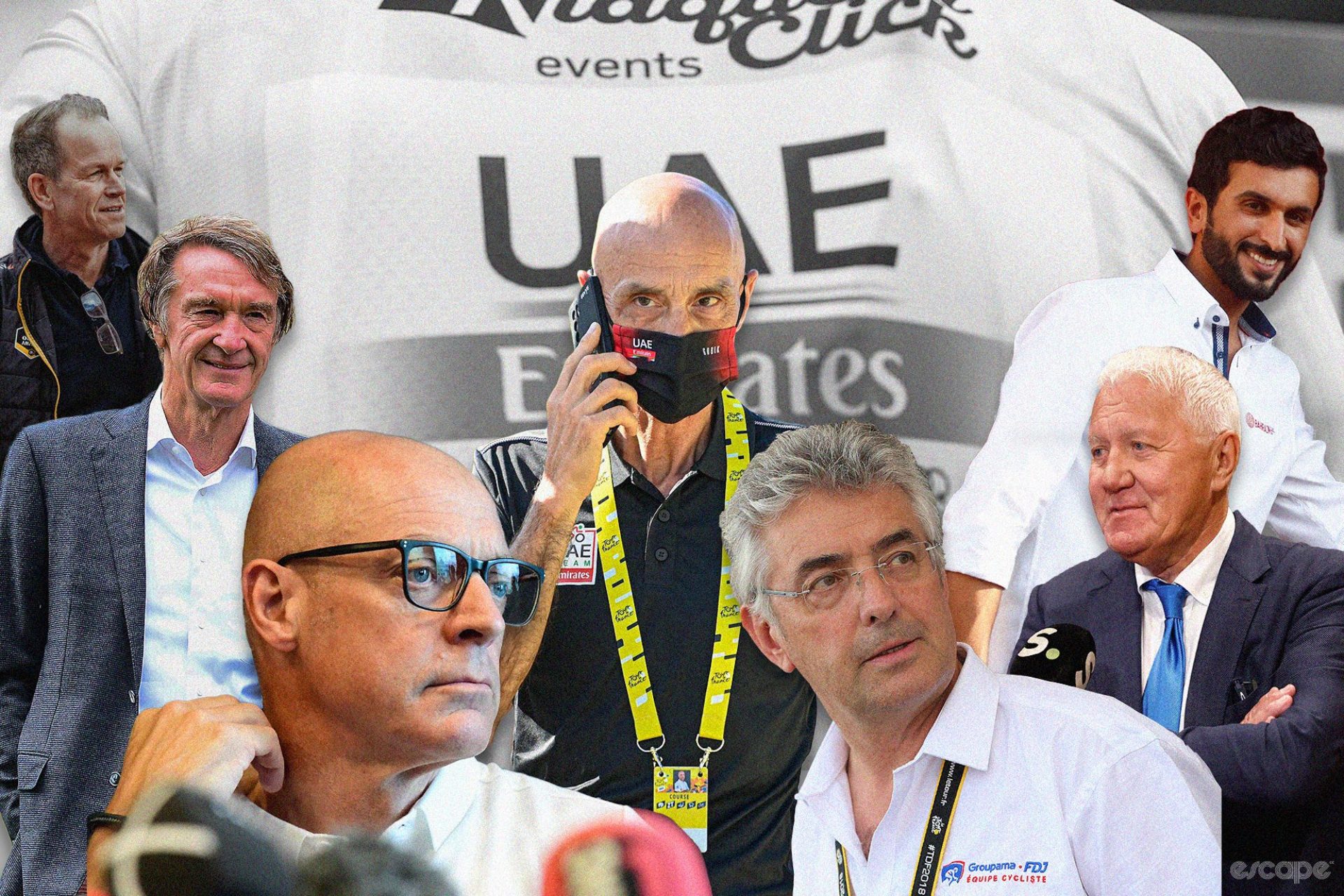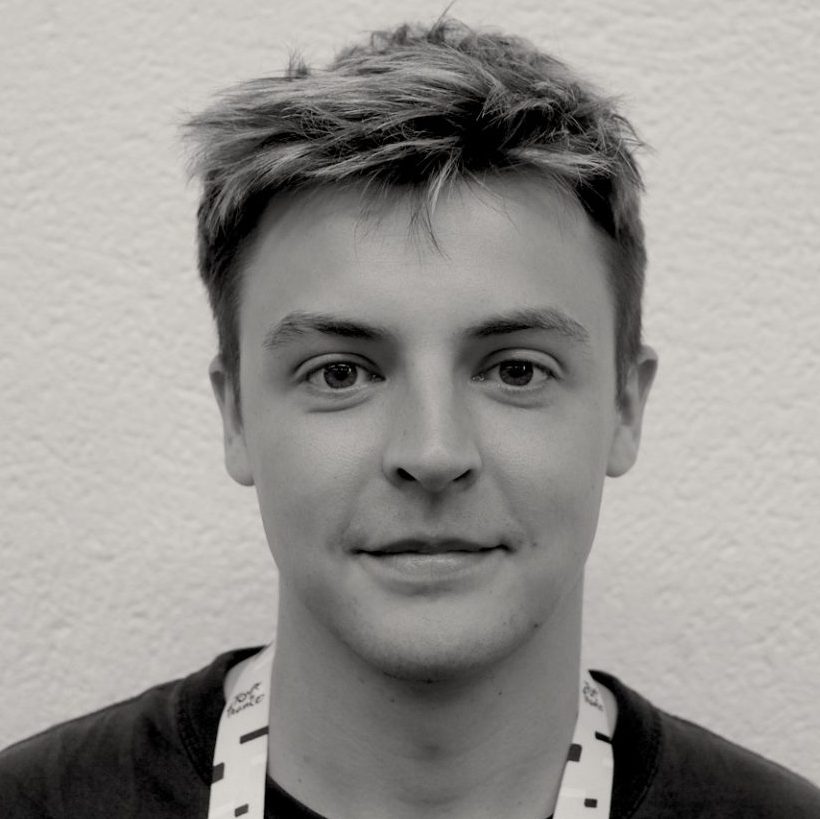Who truly holds the power in professional cycling? The UCI, which sets the rules for the sport? The riders, without whom there would be no sport? What about race organisers such as ASO, who own events such as the Tour de France that tower over professional cycling? Or the teams, backed by funds from moneyed sponsors who pay for the riders to be on the start line?
Nestled within this matrix of bike racing are the general managers and team bosses. Those who help secure the sponsors and then oversee which riders will fill their rosters and where they will race. They hold the keys to the kingdom, operate as the middlemen (they are all men), and seem to keep the many plates of WorldTour bike racing spinning. The 19 individuals detailed below have and will continue to professionally outlast swathes of riders and UCI presidents, further entrenching the power they hold.
Alongside this group of administrative apex predators are the companies that fund the whole enterprise. Their power is possibly only second to the team principals due to the singular and obvious fact that they pay everyone’s wages.
Some team bosses and sponsors you will already know – the larger-than-life characters who have been around the block and then some. But how much do you really know about them? We’ve done some digging, some rummaging around odd corners of the internet, pulling up financial statements that made our brains hurt, and have put together a picture of what the power behind the men’s WorldTour actually looks like.
Jump to a team
- AG2R Citroën
- Alpecin-Deceuninck
- Arkéa-Samsic
- Astana Qazaqstan
- Bahrain Victorious
- Bora-Hansgrohe
- Cofidis
- DSM
- EF Education-EasyPost
- Groupama-FDJ
- Ineos Grenadiers
- Intermarché-Circus-Wanty
- Jayco AlUla
- Jumbo-Visma
- Movistar
- Soudal Quick-Step
- Trek-Segafredo
- UAE Team Emirates
AG2R Citroën
Who’s in charge?
Vincent Lavenu (67) from Briançon, France, turned professional at the age of 27, winning a stage of the Volta a Portugal in the late 1980s while racing for Stephen Roche’s Fagor team. He also rode in the famous 1989 Tour de France, his one and only appearance at the Grand Tour.
After retiring in 1992, Lavenu started his own professional cycling team with a sponsor that followed him from his final seasons as a pro: Chazal, a meat producer in the French Alps.
A few years later, a chain of supermarket coffee stores called Petit Casino became the title sponsor while contributions from the public helped keep the team afloat. In 1997, Petit Casino increased its financial contribution and the squad began to compete in more prominent races before insurance firm AG2R Prevoyance replaced the coffee chain at the turn of the millennium.
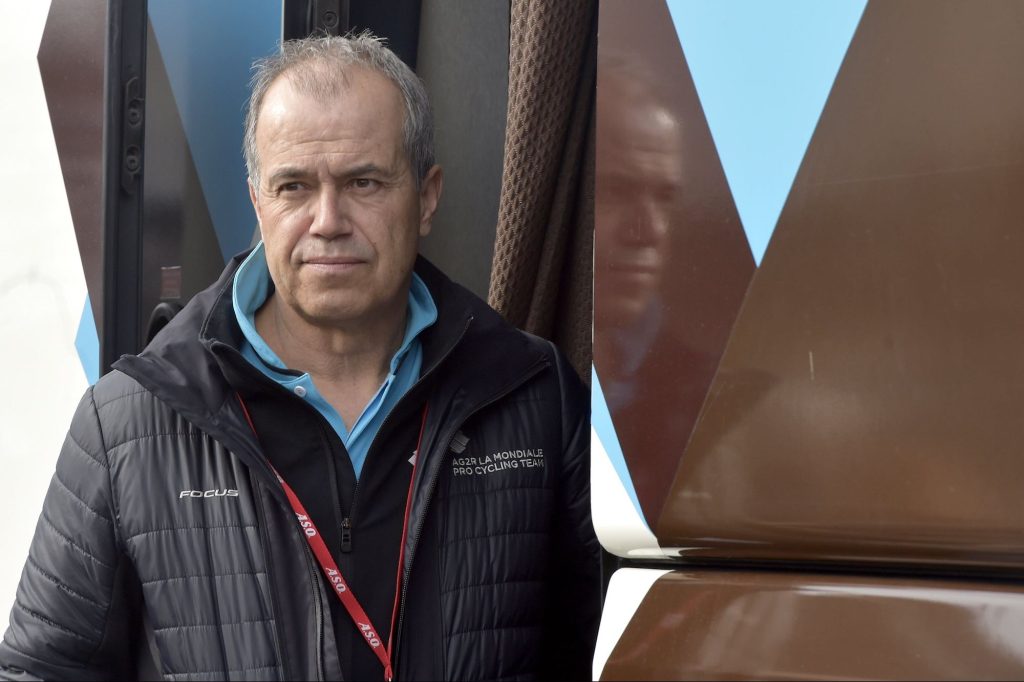
Where does the money come from?
AG2R La Mondiale, entering its third decade of sponsoring the team, is a multinational firm which as well as dealing in insurance also provides financial and pension services. Headquartered in Paris – handy for the final Champs-Élysées stage of the Tour – AG2R manages around €30 billion in pension contributions (one-quarter of all employees in the French private sector) and is also the second largest health insurer, with customers totalling around 15 million.
Citroën is a French car brand previously owned by the Peugeot group but bought in 2021 (the same year they began sponsoring the cycling team) by Stellantis, a multinational car manufacturing behemoth formed by the merger of the aforementioned Peugeot group and Fiat Chrysler Automobiles. It’s the fifth-largest car maker globally with a market cap of nearly $50 billion and annual revenues of $150 billion, more than enough to chuck a few quid at Ben O’Connor and the boys. It once made the 2CV, which is now used to chuck meat sticks at children from the Tour de France caravan.
The chairman of the Stellantis group is John Elkann, the chosen heir of the Agnelli Italian business dynasty, sometimes described as “the Kennedys of Italy,” who have also owned Italian football giants Juventus for 100 years.
Owners of sponsors:
AG2R La Mondiale – Local and regional mutual insurance companies (France)
Citroën – A publicly traded company run by the Agnelli family (Italy/USA)
Alpecin-Deceuninck
Who’s in charge?
Belgian brothers Christoph (49) and Philip Roodhooft (47) are in charge of a team that has Mathieu van der Poel as the star at the centre of its solar system. Christoph is a former cyclist who raced for some smaller Belgian teams and who confessed in 2009 that the doping products (DHEA, or hormone pills) found in his house by investigators three years earlier were his.
Philip was the commercial manager for the Unibet.com team before becoming the general manager when it rebranded to Cycle Collstrop. They then co-founded the team that is now known as Alpecin-Deceuninck, starting with more of a focus on cyclocross. As van der Poel has turned his focus increasingly towards road racing so has his team, graduating from Continental level to ProTeam in 2019 and then joining the WorldTour in 2023 after amassing enough points to be promoted via the new UCI promotion and relegation system. This has signalled a growing ambition for the squad, which could previously (and shrewdly) rely on wildcard invites to any of the top races where they wanted to field van der Poel.
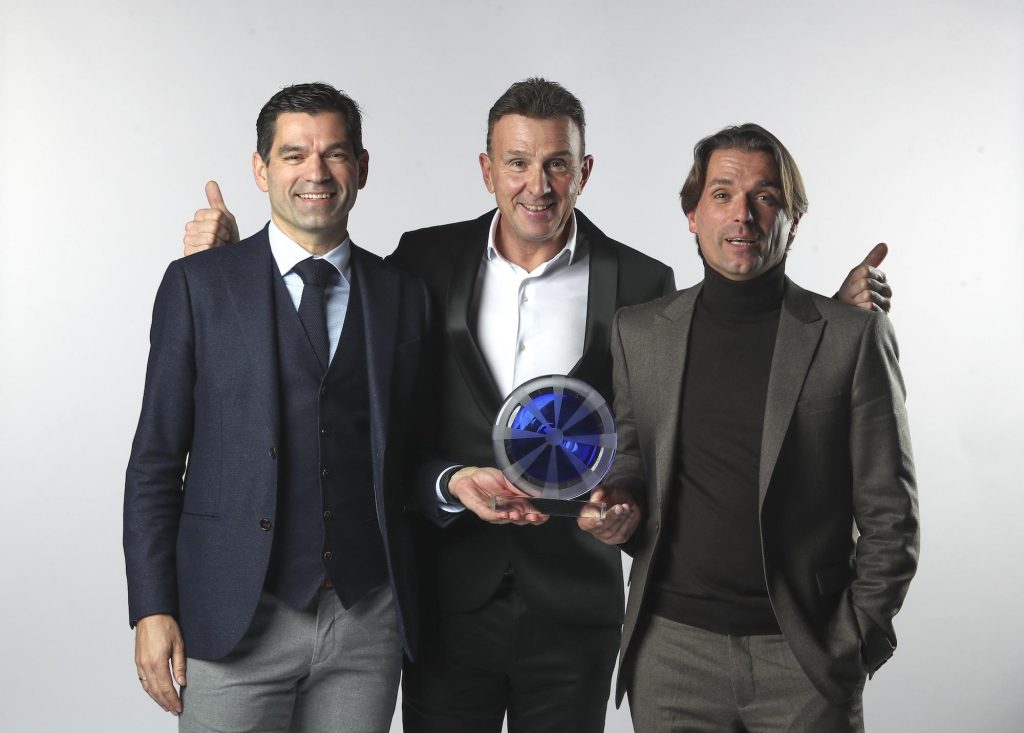
Where does the money come from?
Alpecin is a German shampoo brand for men that claims the inclusion of caffeine in its formula can help reduce hair loss. However, there is debate over the validity of these claims, with UK advertising standards stating the company has inadequate proof to be able to advertise its product in this manner. The brand is part of the larger Dr Wolff Group, founded in 1905, that originally produced cough syrup, cod liver oil, and various teas. One of its first big successes was an iron supplement. The great-grandchildren of the original Wolffs, Eduard R. Dörrenberg and Christoph Harras-Wolff, now run the company that has never left the family’s ownership. The company owns many cosmetic brands (including the Plantur menopausal hair loss brand that used to sponsor the Roodhooft brothers’ women’s team). The Dr Wolff Group currently boasts 675 employees located in over 60 countries.
Alpecin has a history of sponsoring cycling teams. The brand entered the space with the Giant-Alpecin team of the mid-2010s, no doubt tempted by Marcel Kittel’s luscious blonde locks, and then followed the German sprinter to Katusha. After that team folded and Kittel retired, Alpecin found a new star rider with a good head of hair – van der Poel – to fly the flag.
Co-title sponsor Deceuninck is a Belgian company that makes PVC windows and doors. Founded in 1937 in West Flanders, it is a publicly traded company with its executive chairman, the Belgian businessman Francis Jozef Willem van Eeckhout, being its largest shareholder, owning 29% of the company. The firm previously co-sponsored Patrick Lefevere’s Quick-Step outfit before switching to the Roodhooft brothers’ squad.
Owners of sponsors:
Alpecin – The Wolff family (Germany)
Deceuninck – Publicly traded company (BEL)
Arkéa-Samsic
Who’s in charge?
Emmanuel Hubert (52) is a former French cyclist from Brittany who won the national time trial championships in 1994 and the Tour de l’Ain in 1995 when he was part of the infamous Le Groupement team, which folded a week before its debut Tour de France following allegations that the sponsor that gave the team its name was a pyramid scheme. He then raced for Gan for two years before retiring from racing in 1997 and in 2005 became a sports director at the Agritubel outfit. After that team closed in 2009 he joined Bretagne-Schuller (now called Arkéa-Samsic) the following year and became the squad’s general manager in 2014.
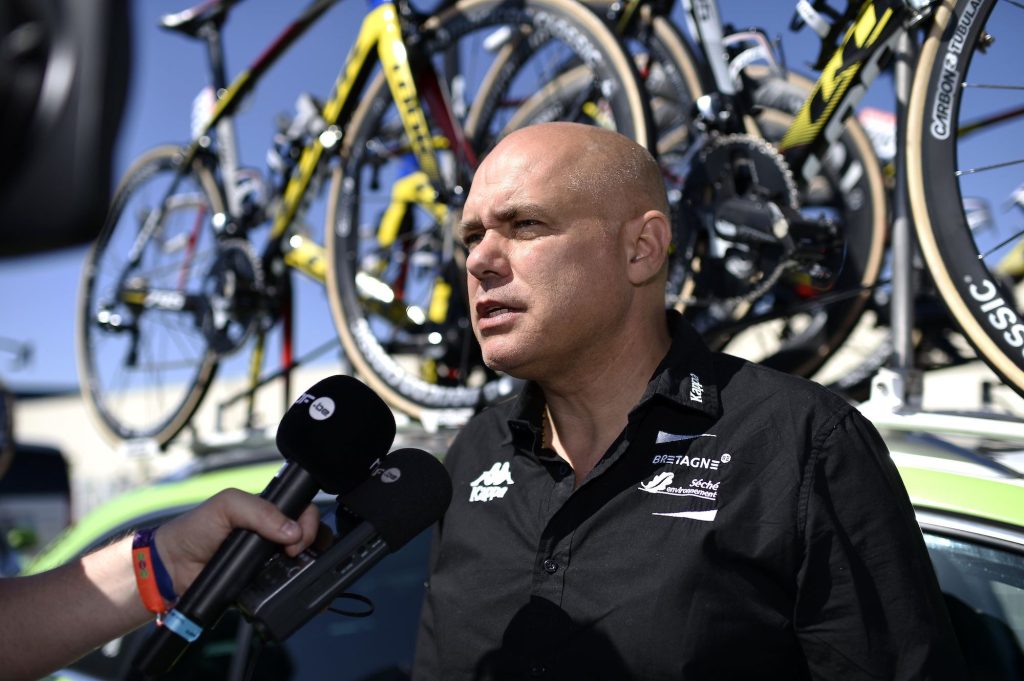
Where does the money come from?
Arkéa, or Crédit Mutuel Arkéa to give the company its full name, is a French cooperative and mutual banking insurance group. Headquartered in Brittany, the group is made up of 30 specialised subsidiary firms, with Arkéa being one of Crédit Mutuel’s six federal branches and the second-largest federal fund within the larger Crédit Mutuel group that also owns Cofidis (Crédit Mutuel is covered in greater detail in Cofidis’ section above).
Samsic is also a Breton company, this one supplying business services. Founded in 1986, it originally specialised in industrial cleaning before becoming a more general subcontractor. Headquartered in Rennes, the company employs a total of 90,000 people with annual turnover of €2.6 billion. The founder and owner, Christian Rolleau, recently handed over the day-to-day running of the business to his son-in-law Thierry Geffroy. The brand also has a history of sponsoring the Rennes football team and Lyon’s rugby outfit.
Owners of sponsors:
Arkéa – Crédit Mutuel (FRA)
Samsic – Christian Rolleau (FRA)
Astana Qazaqstan
Who’s in charge?
Alexandr Vinokourov (49), the former rider and convicted doper, has survived multiple boardroom putsches and remains at the centre of the team after more than 15 years. Astana became involved as a backer after Vinokourov’s Liberty Seguros-Würth outfit lost sponsors in the fallout from the Operación Puerto doping scandal, in which the team was heavily implicated. Following retirement, which came a couple of years after wrestling control of the squad back from Johan Bruyneel and Lance Armstrong, Vinokorouv became manager of the team in 2013.
In 2021, the 49-year-old was briefly sacked during another power struggle between the team’s Kazakh faction and the people installed by Canadian sponsor Premier Tech before he regained control once again. Throughout Vinokourov’s tenure as both rider and manager, doping positives have persisted.
The outfit has struggled in recent seasons, with only seven WorldTour-level wins so far this decade. In 2022, the team re-branded as Astana-Qazaqstan to further forge its national identity, but the squad’s highest-profile signing in years was this past offseason, when Vinokourov acquired the services of British sprinter Mark Cavendish. The money made available to sign Cavendish reflected a new-found (at least for 2023) health of the team’s financials in a departure from the uncertainty that dogged previous years.
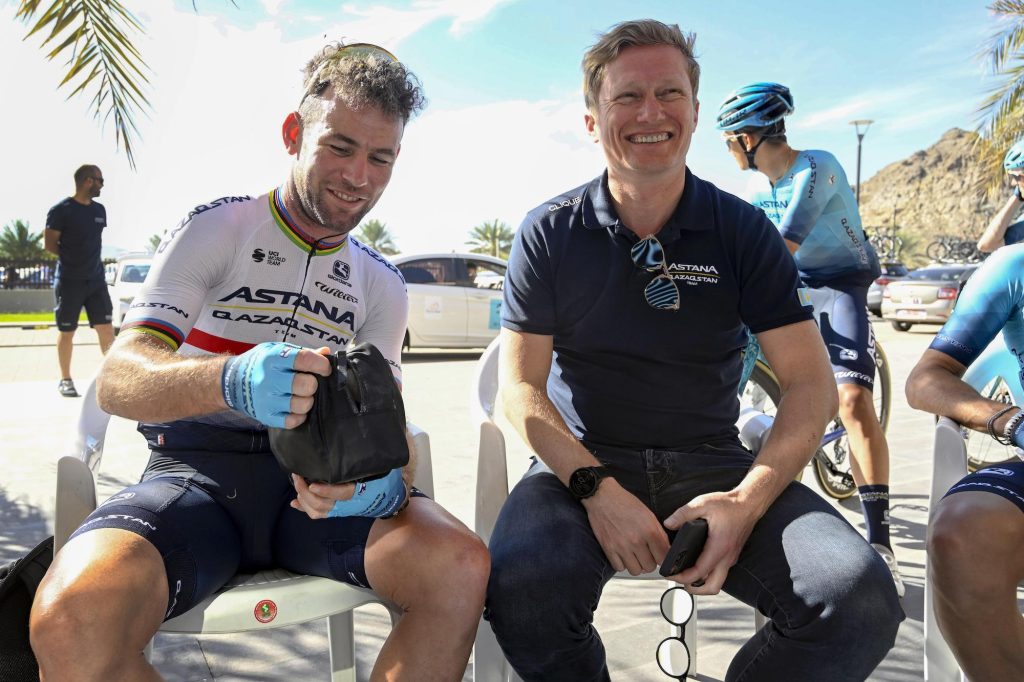
Where does the money come from?
Samruk-Kazyna, the sovereign wealth fund of Kazakhstan, controls assets worth $94.1 billion and employs more than 300,000 people. According to the International Monetary Fund, the fund accounts for about 15% of the country’s total GDP (and the majority of its government revenue). It’s made up of a number of major companies across industries including state oil and gas firms, the state uranium company, the national rail and postal service, and airline Air Astana. This latest iteration was created in 2008 after the merger of the Samruk and Kazyna funds was ordered by then-Kazakhstan president Nursultan Nazarbayev.
The team’s reliance on the health of the nation and its economy means unrest at home disrupts the cycling team that bears the name of its capital. The 2019 Kazakh financial crisis saw the country’s exports nearly halved and the cycling team’s riders weren’t paid for the first few months of the year, leading to protests from the squad at the Giro d’Italia. In 2022, amid political unrest in Kazakhstan following a spike in fuel prices, the riders once again went unpaid for the first few months of the year, replicating a situation that had also occurred in 2021, with Vinokorouv blaming the “slow administrative processing” of government funds.
Owner of sponsor:
The government of Kazakhstan (Kazakhstan)
Bahrain-Victorious
Who’s in charge?
A Slovenian professional cyclist for a decade in the 1990s, Milan Eržen, 52, became the general manager at Adria Mobil in 2003. That team spawned from the KRKA-Telekom Slovenije that Milan rode for in the final years of his racing career.
After a decade at the helm of the Slovenian Continental team, Eržen left in 2013 to become a sports consultant for the Kingdom of Bahrain, a role that seems to have included helping Sheikh Nasser bin Hamad Al Khalifa train for an Ironman, helping develop a Bahrain triathlon team, and hosting the country’s first Ironman event.
The fourth-born son of the King of Bahrain then enlisted Eržen to fulfil his desire of starting a WorldTour cycling team and at the start of the 2017 season Bahrain-Merida lined up with star rider Vincenzo Nibali on its books.
In May 2019, Eržen was linked to the Operation Aderlass doping investigation, with the Austrian doctor at the centre of the case, Mark Schmidt, telling the court in 2020 that Eržen had “wanted to enter into a business relationship” with the doctor. Through his lawyer, Eržen denied having ever worked with Schmidt. When the link to Aderlass emerged, the UCI confirmed a number of Slovenian individuals including Eržen had been carefully monitored since 2015.
While contracted to Bahrain-Victorious, Slovenian cyclist Kristijan Koren was found to have doped as part of the Operation Aderlass investigation and subsequently banned for two years. Another Slovenian cyclist turned sports director for the team, Borut Božic, was also handed a two-year ban for his connection to the Aderlass doping ring. Both suspensions relate to doping that occurred in the early 2010s, before their time on Bahrain. At both the 2021 and 2022 Tours de France, the team were raided by police on suspicion of doping. Riders and the team maintain their innocence and at the time of writing nothing further has arisen from those searches. Eržen himself has never been charged in connection with Aderlass or been subject to sporting sanction.
Where does the money come from?
The team is financed by the government of Bahrain, at the behest of the aforementioned Nasser bin Hamad Al Khalifa, with the team’s website stating its purpose is to “expedite its vision to showcase the ambition and optimism of the Kingdom of Bahrain to the world”.
The official financial backers of the squad include the Bahrain Economic Development Board, the Bahrain Petroleum Company, Bahrain’s principal telecommunications company, Batelco, the National Bank of Bahrain, Al Salam Bank, and Bahraini aluminium company Alba.
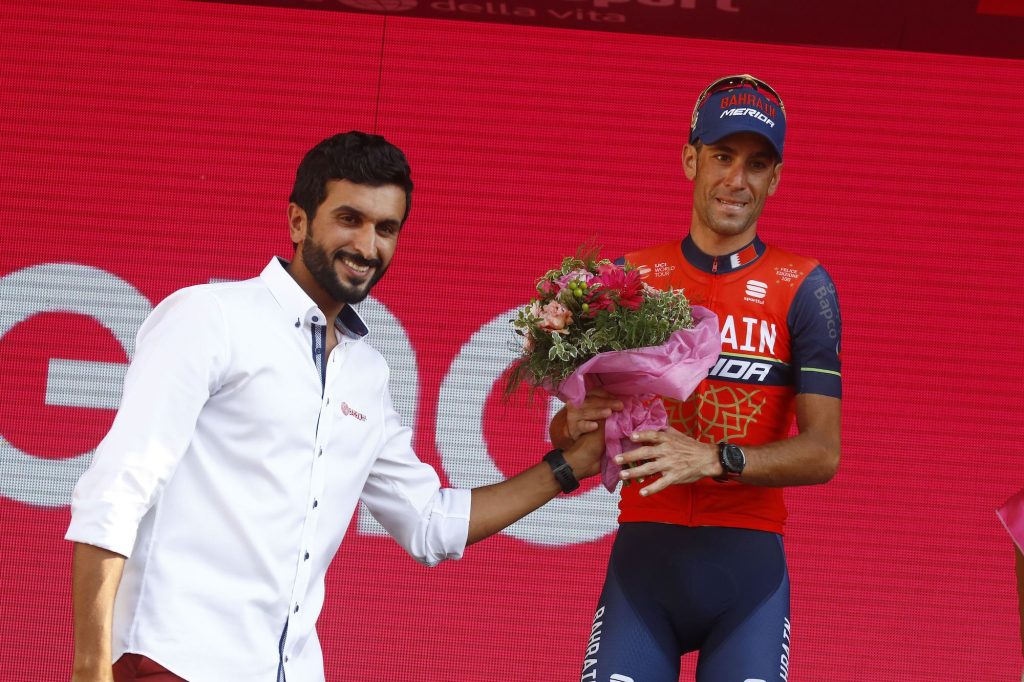
Thirty-five-year-old Al Khalifa has been accused of being directly involved in the torture of three prisoners in Bahrain following a pro-democracy uprising in 2011. The government of Bahrain has denied the allegations made against the prince.
The House of Khalifa, the ruling family of the Kingdom, are Sunni, the largest branch of Islam that accounts for around 90% of all Muslims. The family has governed Bahrain since the late-1700s and currently rules as a semi-constitutional monarchy.
Owner of sponsor:
The government of Bahrain (Bahrain)
Bora-Hansgrohe
Who’s in charge?
Predominantly an amateur cyclist during his racing days, Ralph Denk won numerous Bavarian Regional Championships in Germany before opening a bike shop in 2000 and creating the Ralph Denk Racing cycling team.
A decade later, the now-49-year-old founded Team NetApp, a UCI Continental outfit backed by the American data management company that gave the team its name. That team was then promoted to ProContinental status for the 2011 season.
Denk merged the team with British squad Endura Racing in 2013 before announcing his team had acquired the German cooking surface and extractor manufacturer Bora as a new title sponsor for the 2015 season. Bathroom fittings manufacturer Hansgrohe joined ahead of the 2017 season, which would also be the German squad’s first at WorldTour level.
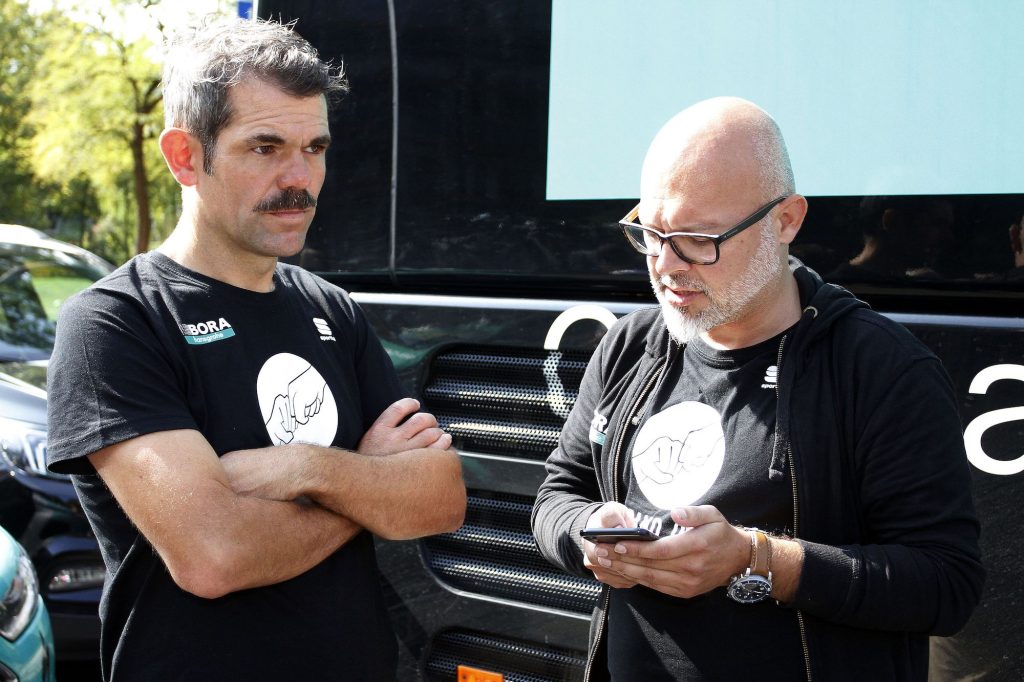
Where does the money come from?
The founder and CEO of Bora is 55-year-old German Willi Bruckbauer, who founded the company that produces innovative kitchen appliances including extractor fans, cooktops and ovens. Bruckbauer’s dream growing up was to become a professional cyclist but he didn’t quite make it, instead becoming a master carpenter and earning a living designing and making kitchens before starting Bora in 2007. His sponsorship of Denk’s cycling outfit pertains to the more traditional relationship between team and financial backer as Bruckbauer looked to increase awareness around his brand in an area of personal interest to him.
Hansgrohe is a “sanitary fittings manufacturer”, which in plain English means they make showers and taps. Founded by a man called Hans Grohe in 1901 as a three-person operation creating watch parts, pans, and sheet metal showers in the eastern Black Forest region of Germany, the company now employs nearly 5,000 people and has annual revenues of over €1 billion. The family of Klaus Grohe, Hans’ youngest son, still owns 32% of the business while the Masco Corporation, an American conglomerate consisting of more than 20 manufacturing companies, owns the remaining 68%.
Owners of sponsors:
Bora – Willi Bruckbauer (Germany)
Hansgrohe – Masco Corporation (USA)
Cofidis
Who’s in charge?
Cédric Vasseur (52) is a retired French professional cyclist who wore the yellow jersey and won two stages of the Tour de France during his career, following in the footsteps of his father, Alain, who rode three French Grand Tours and won a stage from a solo breakaway.
Cédric’s first stage win, in 1997, was also thanks to a long solo breakaway totalling 147 km that subsequently gave him the race lead for five days. He joined the US Postal Service team in 2000 but left after being omitted from the team’s 2001 Tour squad, citing personal differences with Lance Armstrong. It later emerged that those differences were Vasseur’s refusal to participate in the team’s doping programme.
Vasseur then signed for Cofidis and was arrested on suspicion of doping alongside several teammates including David Millar, although counter-analysis of samples provided by Vasseur came back negative and his name was cleared. He won a second stage of the Tour in 2007, which would be his final season in the peloton.
In retirement, Vasseur became the president of the cyclists’ CPA union and a TV pundit. Cofidis hired its former rider as the team’s new general manager for the 2018 season to replace serial team boss Yvon Sanquer who was sacked following a run of poor results.
Where does the money come from?
Founded in 1982, Cofidis is a French consumer loans company that has bankrolled a cycling team bearing its name since 1997, one of the longest runs in the sport as a team sponsor. Situated in the town of Villeneuve-d’Ascq, between Lille and Roubaix, it is now owned by Crédit Mutuel, a French co-operative banking group that has more than 30 million customers.
Crédit Mutuel can trace its origins back to the German co-operative movement of the 1880s in Alsace-Lorraine when the area was under German rule. The Crédit Mutuel group consists of 82,000 employees, is headquartered in Paris, and boasts annual revenues upwards of €17 billion. It is another banking group that belongs exclusively to its members, who own its capital and decide on business strategy democratically.
Owner of sponsor:
Crédit Mutuel (France)
DSM
Who’s in charge?
Iwan Spekenbrink has been with the team since its inception in 2005, coming from a background in sports management and marketing and having raced as a junior.
The 47-year-old Dutchman has also been president of the AIGCP cycling union since 2015 and is a vocal anti-doping advocate.
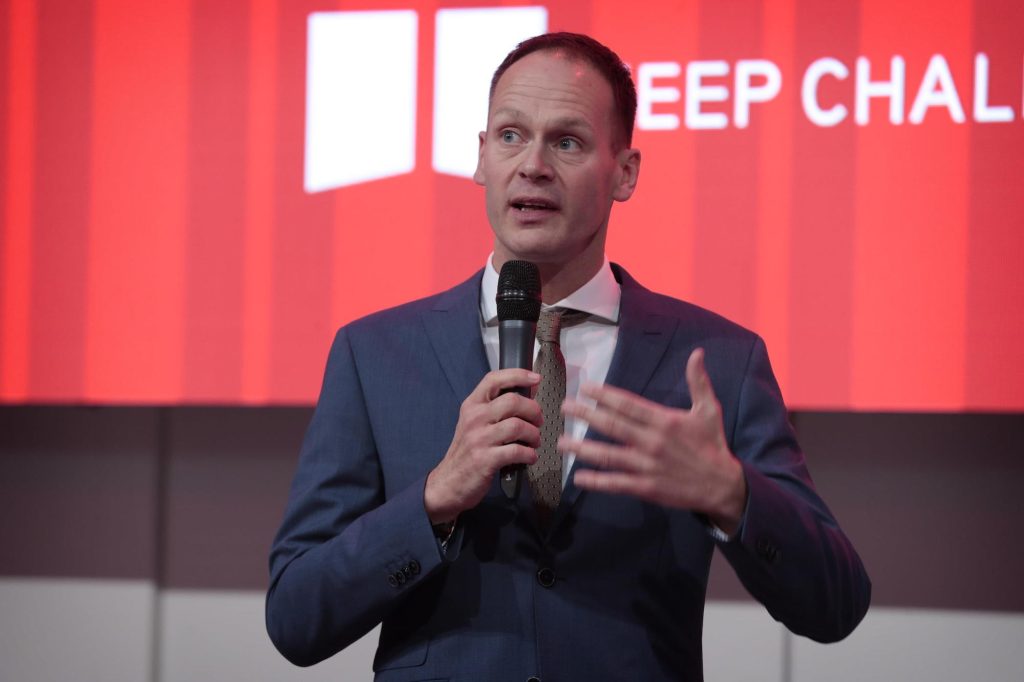
Where does the money come from?
DSM is a Dutch multinational corporation involved in health, nutrition, and materials. It was created by the Dutch state in 1902 to mine coal before diversifying into commodity chemicals and petrochemicals when the last Dutch mine closed in the 1970s. The name DSM remains, however, and stands for Dutch State Mines.
The company was floated in 1989 and by 1996 was fully privatised. It has over 20,000 employees and annual revenues of more than €10 billion. Its largest shareholder (despite owning less than 5% of the company) is the Norwegian central bank.
Owner of sponsor:
DSM – publicly traded company (Netherlands)
EF Education-EasyPost
Who’s in charge?
Among the more visible and outspoken GMs in cycling – at least for English language fans – Jonathan Vaughters (49) founded the original Slipstream organisation as a junior development team, which has slowly morphed into today’s EF Education-EasyPost.
Vaughters raced with US Postal and Credit Agricole and admitted to using EPO from 1996 to 2000, and again in 2002. He retired from racing in 2003 and started Slipstream. The last rider from that original squad was Alex Howes, who retired from the WorldTour at the end of 2022.
Vaughters has rarely been afraid to speak his mind and for a time was the president of the AIGCP, which represents professional teams.
Where does the money come from?
EF Education is a Swedish-founded, Boston-based company that primarily provides educational tours and language programs. The company came onboard in 2017, but the relationship is far deeper than a traditional title sponsorship.
EF saved the team from near-oblivion that winter, buying out Slipstream’s majority shareholder Doug Ellis as the program teetered on the edge of collapse, unable to find replacement sponsors after a year as Cannondale-Drapac. The way Vaughters tells it, a highly publicised direct appeal to fans for funding that summer showed EF that the team had a dedicated fanbase and helped get the deal over the line.
The Hult family, owners of EF Education, aren’t particularly avid cyclists, though Edward and Phillip Hult do ride bikes recreationally.
EasyPost provides a single gateway to ship via over 100 different carriers (companies like DHL, UPS, USPS, FedEx). It is a traditional sponsor, unlike part-owner EF. Jarrett Streebin, the company’s founder, has used sports sponsorships to increase brand awareness within key (read: relatively wealthy) demographics as the company aims at an eventual IPO.
Owners of sponsors:
EF Education – Hult family (Sweden)
EasyPost – Jarrett Streebin (USA)
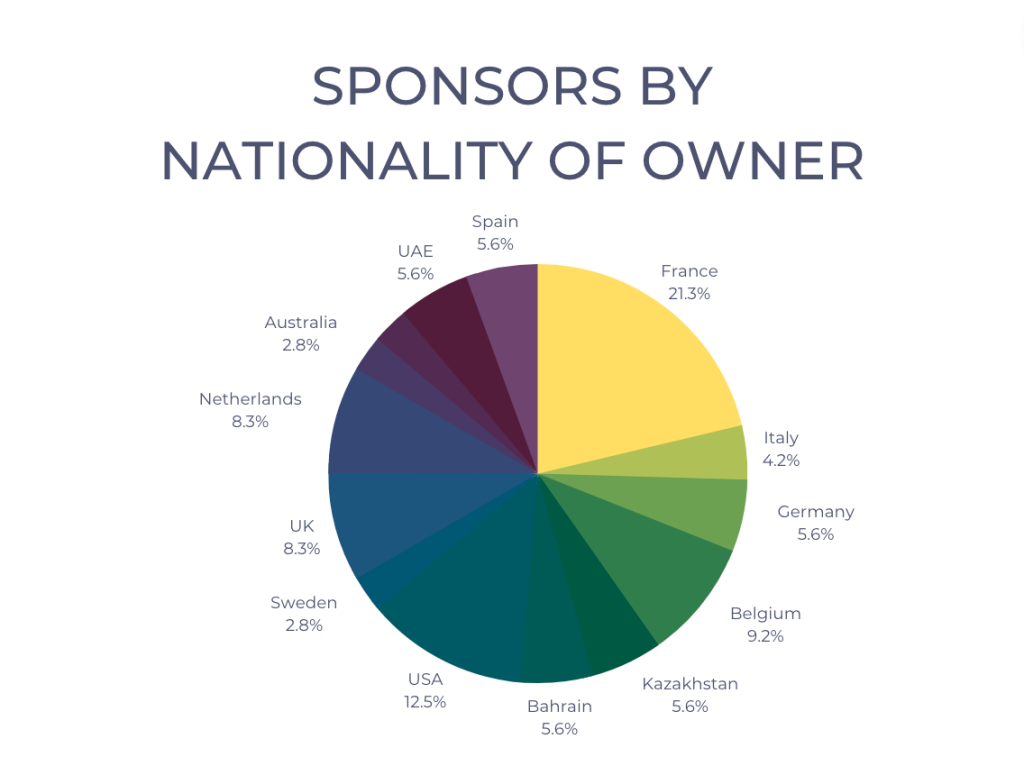
Groupama-FDJ
Who’s in charge?
If you’ve not heard of him you’ve likely still heard him. Marc Madiot is a larger-than-life character, often found hanging out of a team car window shouting “Allez Thibaut!” and managing to contain all of the spirit of the Tour de France inside one human body.
The 63-year-old retired pro has an enviable palmares, having won a stage of the Tour de France, the French road race championships, and two Paris-Roubaix titles during his career. Three years after retiring, Madiot launched the squad that is now called Groupama-FDJ as a response to the shrinking pool of French professional riders. The situation was so desperate that the 1996 national championships were held as a pro-am competition. Madiot maintains a close working relationship with his long-standing sponsor, Française des Jeux.
Where does the money come from?
Française des Jeux, shortened to FDJ, is the operator of France’s national lottery as well as online sports betting and gambling. The company was 72% owned by the French government until the summer of 2018 when it decided to take the company public and sell off half of its share in order to bolster its balance sheet. FDJ has more than 2,000 employees and annual revenues of around €2 billion.
French insurance company Groupama joined as co-title sponsor in 2018, adding 25% to the annual budget of the squad. It is one of the largest mutual insurers in the world. The company has more than 30,000 employees worldwide, operates in 10 countries, and has annual revenues of €15 billion.
Owner of sponsor:
Groupama (France)
FDJ – Government of France (France)/majority public company (France)
Ineos Grenadiers
Who’s in charge?
Dave Brailsford (59), or Sir David Brailsford to give him his proper stylings, was training to become an engineering technician before he moved to France for four years in his 20s to race as a sponsored amateur. He was first employed by British Cycling after the introduction of lottery funding in 1998, soon after the UK had transformed the way its Olympic sporting endeavours were financed.
Brailsford’s success at numerous Olympic Games paved the way for the offshoot road racing squad sponsored by British broadcasting and telecoms company Sky. At the helm of Team Sky, Brailsford oversaw six overall victories at the Tour de France, before securing funding from British billionaire Jim Ratcliffe following Sky’s withdrawal in 2019.
The success of Brailsford and his team has not been without controversy. In 2018, a British government select committee concluded that Team Sky had crossed an “ethical line” by exploiting exemptions for therapeutic drug use to “enhance the performance of riders”. As the questions continue to stack up, particularly after team doctor Richard Freeman was found guilty of ordering banned testosterone “knowing or believing” it was to be given to a cyclist for doping purposes, Brailsford now plays much less of a public role in the team, with Rod Ellingworth returning to the setup in the general manager position.
Brailsford, meanwhile, now holds a “Director of Sport” role at Ineos, overseeing various sporting endeavours sponsored by the chemicals giant.
Where does the money come from?
Jim Ratcliffe, also a Sir, is the CEO and founder of the Ineos chemicals group and has a current net worth of around $16 billion per Forbes’ billionaires list, putting him 111th on its list of richest people worldwide. Founded in 1998, Ineos’ strategy was to buy unwanted operations from other companies that he believed could double their earnings within five years. Ratcliffe still owns two-thirds of the company that employs 26,000 people and has annual revenues of $61 billion.
In 2017, Ratcliffe entered into his first of what would be many sports ownership and sponsorship deals with the purchase of Swiss football side FC Lausanne-Sport. He has subsequently sponsored British sailor Ben Ainslie, bought the French football club OGC Nice, entered sponsorship deals with the New Zealand national rugby squad and the Mercedes Formula 1 team, before also bidding for Premier League football clubs Chelsea (unsuccessfully) and Manchester United (ongoing).
Of course, of most interest to you and I was his move into cycling as he took over the sponsorship of Team Sky – with environmental protestors greeting him at the unveiling of his new squad at the Tour de Yorkshire. Greenpeace also described his company’s sponsorship of the All Blacks as inconsistent with the country’s environmental values.
Owner of sponsor:
INEOS – Jim Ratcliffe (UK)
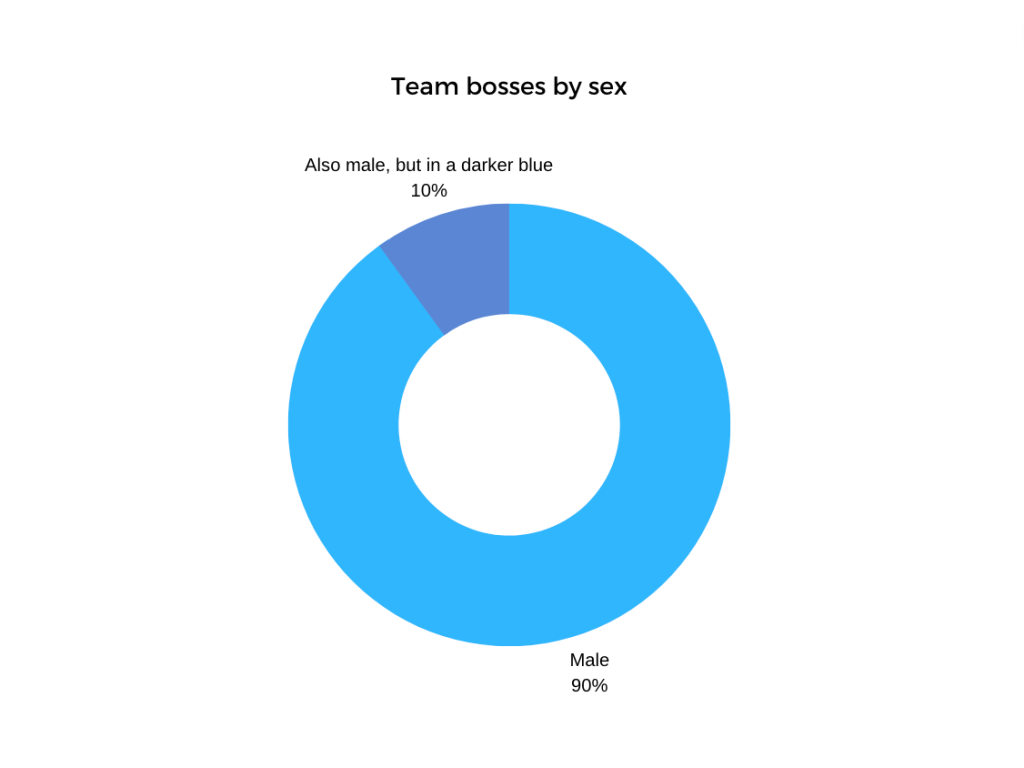
Intermarché-Circus-Wanty
Who’s in charge?
Jean-François Bourlart (48) joined the squad when it was a low-key under-23 Belgian amateur team. His sensible management, in contrast to the flashier, braggadocio stylings of some of his peers, has seen the squad slowly rise up the ranks to the top level.
The team moved up to UCI Continental status in 2007, then became a Pro Continental outfit four years later before stepping up to WorldTour level in 2021 after buying the defunct CCC team’s licence. That was also the year Intermarché joined long-term sponsors Wanty before a watershed year in 2022 where Biniam Girmay became the first black African rider to win a Classic and Grand Tour stage and announce himself as the next big thing in cycling.
Where does the money come from?
Intermarché is a French supermarket chain founded in 1969 with annual revenues of more than €35 billion. Its parent company is called Les Mousquetaires (the Musketeers), which operates a retail group of independent brands usually carrying the -marché suffix, all of which are supplied products by the privately owned Les Mousquetaires group. Both Intermarché and Les Mousquetaires were founded by French entrepreneur Jean-Pierre Le Roch.
Circus is a privately owned casino gaming and sports betting website. It is operated by the Ardent Group, a Liège-based business that runs 30 casinos in Belgium and has since expanded to other European countries. Circus’s turnover is more than €250 million annually and its two founders, Emmanuel Mewissen and Jean-Marie Leonard, still run and own the business.
Wanty was founded in 1946 by Maurice Wanty, an architect, with the business specialising in masonry work and small-scale civil engineering, building houses and concrete structures at coal mining sites. Proceeding generations of the family have built the company into an industrial group consisting of 1,500 employees and an annual turnover of €250 million.
Owners of sponsors:
Intermarché – Les Mousquetaires retail group (France)
Circus – Ardent Group (Belgium)
Wanty – The Wanty family (Belgium)
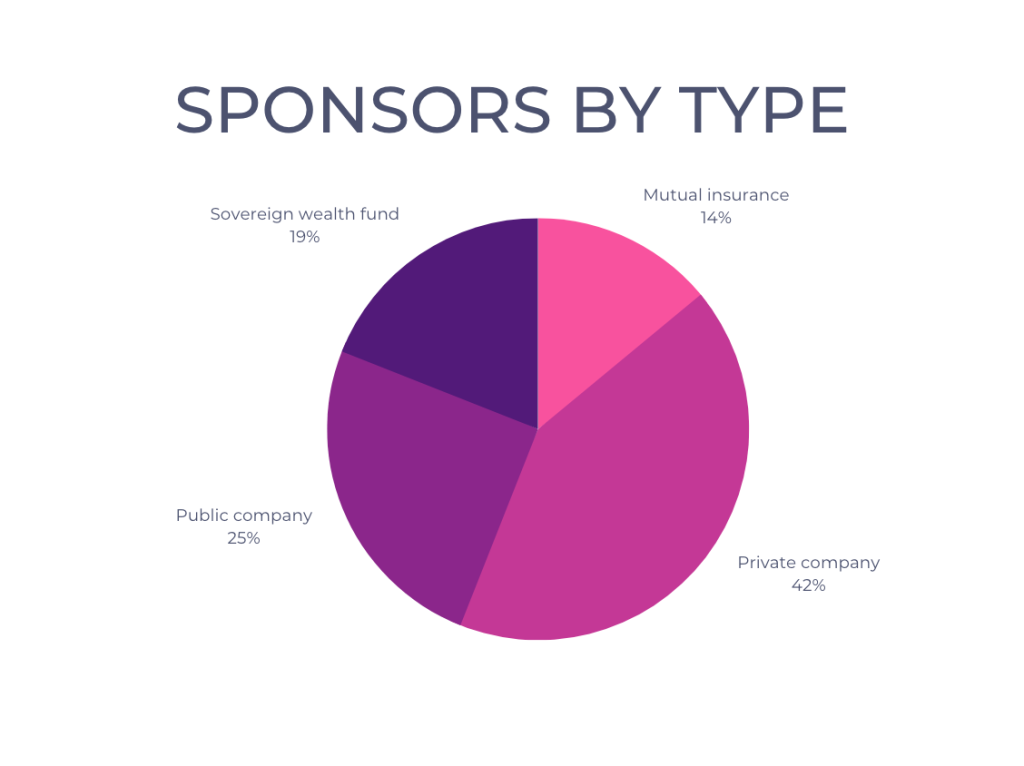
Jayco-AlUla
Who’s in charge?
Brent Copeland (51) moved to Switzerland in the mid-1990s to try and make it as a professional cyclist but soon found himself working with teams, eventually becoming a sports director for the Lampre squad in 1999. After a decade in the role he left the sport to work for MotoGP rider Ben Spies before returning to cycling to help manage MTN-Qhubeka, Lampre, and then Bahrain-Merida. In 2020, he joined Jayco-AlUla, then called Mitchelton-Scott, to become the team’s general manager.
Where does the money come from?
Australian businessman Gerry Ryan is the team’s founder and part-owner. Thought to be worth around €300 million as of his last appearance (2018) on the Financial Review Rich List, he owns wineries (including Mitchelton, which previously sponsored the team), resorts, the theatrical company Global Creatures, and is the owner and founder of caravan company Jayco. He also owns or part owns an Australian women’s basketball team, men’s football (soccer) team, men’s rugby league team, and the 2010 Melbourne Cup winner Americain.
Ryan founded Jayco Australia in 1975 when he was working for Sunwagon Trailers and travelled to the USA to meet the people, Jayco Inc., who were making the components for his employer’s vans. Ryan returned home to his shed to build the first prototype before the first product was released in 1976. More than 40 years later, more than 200,000 caravans have been sold and the company employs 1,000 people.
For more than 30 years, Ryan has invested heavily in Australian cycling, not only through the team now known as Jayco-AlUla, but through the sponsorship of races (e.g. the Jayco Herald Sun Tour or Mitchelton Bay Cycling Classic), and even individual athletes.
AlUla is a city in northwestern Saudi Arabia that dates back to the sixth century BC. The Royal Commission for AlUla, set up by the Government of Saudi Arabia, was established in 2017 to preserve and develop the place and promote tourism to the area while in 2019 the Crown Prince Mohammed bin Salman launched the Al-‘Ula vision.
An airport built there in 2011 has been developed and now receives international flights, the Sharaan luxury resort is set to open in 2024, and the “Winter at Tantora” festival saw musical performances from the Chainsmokers and the rapper Tinie Tempah. These developments tie in with the broader reforms being seen under the rule of Mohammed bin Salman to rebrand his country’s image internationally and diversify from Saudi Arabia’s dependency on oil exports. However, there is evidence that while some new-found freedoms are being granted, brutal repression of dissenting voices has also flourished.
Owners of sponsors:
Jayco – Gerry Ryan (Australia)
AlUla – Government of Saudi Arabia (Saudi Arabia)
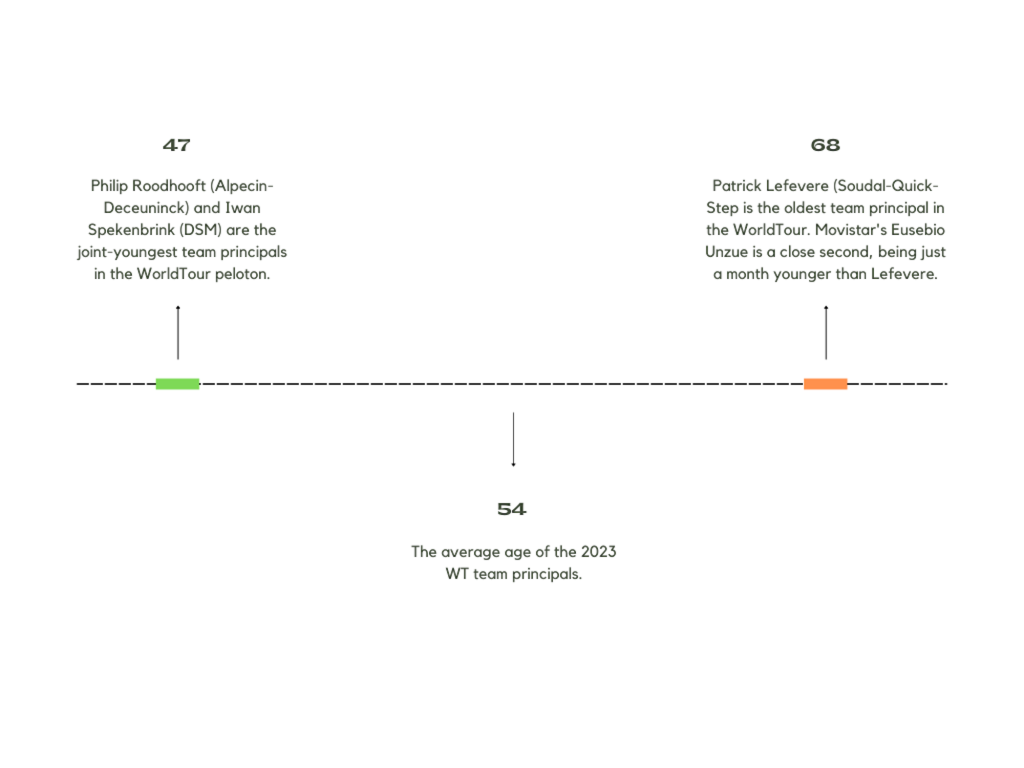
Jumbo-Visma
Who’s in charge?
Richard Plugge (53) worked as a journalist for many years before becoming the director of what would eventually become the Jumbo-Visma team. In 2012, Rabobank ended its sponsorship of the Dutch squad following the USADA report into doping in cycling. The banking firm was left convinced bike racing could no longer be considered a fair and clean sport. The Dutch daily newspaper de Volkskrant claimed in an investigation the same year that Rabobank riders had been doping since 1998.
As the squad searched for new long-term funds, in 2013 it operated without a title sponsor as ‘Blanco Pro Cycling Team’ up until the Tour de France when Plugge announced he had secured consumer electronics company Belkin as the team’s new backers.
For the 2015 season, sponsorship agreements were agreed with the Dutch national lottery and Dutch supermarket chain Jumbo, which Plugge says moved the team from a period of survival to one of long-term planning. The addition of Norwegian software company Visma in 2019 bolstered the budget with Jumbo-Visma emerging in the early 2020s as one of cycling’s super teams. The team reached its zenith with a dominant team performance at the 2022 Tour de France, winning three of the four classification jerseys.
Where does the money come from?
The Jumbo supermarket chain originated as a grocery wholesale company established in 1921. It operates in the Netherlands and Belgium and is the second-largest supermarket chain in the Netherlands with more than 700 stores and an annual revenue topping €10 billion for the first time in 2022.
The company is privately owned by the Van Eerd Group. Frits van Eerd Senior began the grocery wholesale company before his son Karel van Eerd built it into a small chain of supermarkets. His son Frits van Eerd Junior then grew it into the retail empire it is today. Jumbo also sponsors a number of motorsport endeavours, including Formula 1 world champion Max Verstappen, a result of Frits Jr. himself having raced in motorsport since an early age.
Frits van Eerd Jr. was forced to temporarily step down from Jumbo in 2022 after his home was raided in connection with a major money laundering investigation and hundreds of thousands of Euros in cash were found at his property. In 2023, the company announced it would end most of its motorsport affiliations (not including the Verstappen sponsorship), following the scandal.
Visma is a Norwegian software company that provides business and commerce solutions as well as cloud infrastructure services. The firm has 12,500 employees and revenues of €1.4 billion. It is majority owned by private equity firm Hg, a company that targets tech buyouts in Europe and the USA and boasts assets of $55 billion. Its $12.2 billion buyout of Visma was Europe’s largest software buyout to date.
Visma has also sponsored the long-distance skiing championships since 2015 and both Jumbo and Visma sponsor a speed skating squad.
Owners of sponsors:
Jumbo – Van Eerd Group (Netherlands)
Visma – Hg (UK)
Movistar
Who’s in charge?
Eusebio Unzué (68) has been there since the start. After racing as an amateur he led the Reynolds junior and amateur teams in his early 20s before the professional outfit was formed in the early 1980s and Unzué stepped up to become one of the squad’s sports directors.
As champion riders came and went and the team changed names to Banesto and Caisse d’Épargne, Unzué remained, eventually taking over as general manager upon the retirement of stalwart team boss José Miguel Echavarri who had been there since the squad’s inception. In 2011, Movistar became the title sponsor and more than a decade later Unzué is still at the helm.
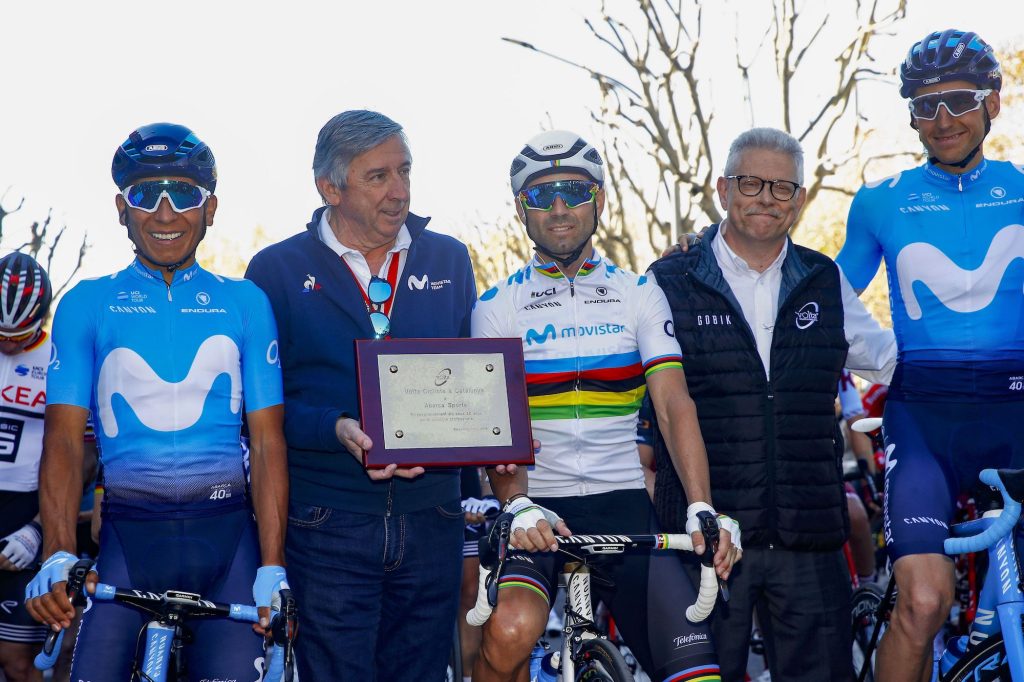
Where does the money come from?
Movistar is the largest phone and cable television provider in Spain, and the second-biggest mobile carrier in Mexico. The company was purchased by Spanish multinational telecommunications company Telefónica in 2005 (the year it also purchased British brand O2) and the brand name was rolled out for use in its South American operations.
Telefónica began in Madrid in 1924, with the Spanish state acquiring 79.6% of the business by law in 1945. The company remained the only telephone operator in the country until 1997 when the market was liberalised and today the firm is a 100%-listed company. The biggest shareholder is the American investment firm BlackRock, which owns 6.7%. Telefónica holds total assets of €109 billion, has annual revenues of €39 billion and employs 100,000 people worldwide.
Owner of sponsor:
Subsidiary brand of parent company Telefónica (Spain)
Soudal Quick-Step
Who’s in charge?
Outspoken, successful, divisive. What everyone can agree on is that there’s no escaping Patrick Lefevere (68). A winning rider in his own right in the late 1970s, with victory at Kuurne-Brussels-Kuurne and a stage of the Vuelta a España, the Belgian then transitioned into becoming a sports director. Part of the kaleidoscopic Mapei squad, Lefevere would go on to create his own team, first as Domo-Farm Frites and then with long-term partner Quick-Step. In 2010, Lefevere partnered with Czech businessman Zdeněk Bakala, who now owns the team, with Lefevere as CEO.
Never far from controversy thanks to provocative column headlines in Belgian newspapers, the 68-year-old’s riders are also never far from the sports headlines for winning bike races. Lefevere’s is one of if not the most successful squad in the history of professional cycling, with over 800 victories to its name.
Where does the money come from?
Before we get to the sponsors, let’s talk Zdeněk Bakala. Rarely are teams so transparent in who owns what. The 62-year-old is said to be one of the wealthiest people in the Czech Republic, with stakes in various mining, energy and financial businesses, as well as owning Czech media company Economia. He emigrated to Lake Tahoe, Nevada, at the age of 19—with, supposedly, a $50 bill hidden inside a sandwich—and is now worth almost $2 billion. While Lefevere’s team (if we are to believe the bluster) is constantly scrambling around for more money to subsidise its budget even as it out-punches some of its wealthier rivals in terms of results per $ spent, then you would imagine Bakala provides a certain level of financial stability.
Quick-Step is a flooring company that has sponsored the team since its inception for more than two decades. The company dates back to 1960, when a couple of families in West Flanders started a flax cultivation business. This material became scarce in the 1970s and so they changed focus to wood, originally supplying it for decorative use before a Dutch client used their panels for flooring and the company transitioned into the area of its own volition in the 1990s. Today, Quick-Step is owned by Mohawk Industries, an American flooring manufacturer based in Calhoun, Georgia. The company has annual revenues of $10 billion and is part of the S&P 500 stock market index.
Soudal was a long-term sponsor of rival Belgian stalwart team Lotto-Dstny until the end of 2022. The Belgian company produces sealants, adhesives and foams. Founded in 1966, it was originally a small producer of welding materials. The company’s founder, Vic Swerts, remains the chairman to this day and still owns 100% of his firm, employing 3,500 people and turning over more than €1 billion annually.
Owners of sponsors:
Quick-Step – Mohawk Industries (USA)
Soudal – Vic Swerts (Belgium)
Trek-Segafredo
Who’s in charge?
After graduating from university, Luca Guercilena (49) managed a junior cycling team in Milan while also joining the carabinieri, Italy’s military police. His cycling work took him to the Mapei Center where they were conducting some tests with his squad when the center’s founder Aldo Sassi asked him to join his team. He spent 10 years there before becoming a trainer and sports director at Quick-Step.
Guercilena then joined Leopard Trek as a sports director the year it was founded in 2011, becoming general manager two years later.
Trek took over ownership of the team and its licence in 2014, with Segafredo coming on board in 2016 as co-title sponsor.
Where does the money come from?
The Trek Bicycle Corporation was founded by Dick Burke and Bevil Hogg in 1975 in Wisconsin as a subsidiary to Burke’s Roth Corporation, an appliance distribution business. The company built and sold 900 bikes in its first year. Fast forward to today and the company—run since 1997 by Burke’s son John—sells bikes in over 90 countries and has revenues nearing $900 million.
The Segafredo coffee brand is owned by the Massimo Zanetti Beverage Group, a privately owned group of brands which claims to be one of the largest companies in the coffee industry. Segafredo was an historic coffee producer based in Bologna bought by Zanetti when he moved there in the 1970s. In 1994, Zanetti was elected to the Senate of Silvio Berlusconi’s Forza Italia government.
Prior to becoming involved in cycling, Zanetti was the president and majority shareholder of the Bologna football club. At the same time his sponsorship of the Trek cycling team began, the 75-year-old also became involved with Bologna’s basketball team, one of Italy and Europe’s most successful clubs, which he went on to become the majority shareholder of in 2017.
Owner of sponsor:
Trek – Roth Corporation (USA)
Segafredo – Massimo Zanetti Beverage Group (Italy)
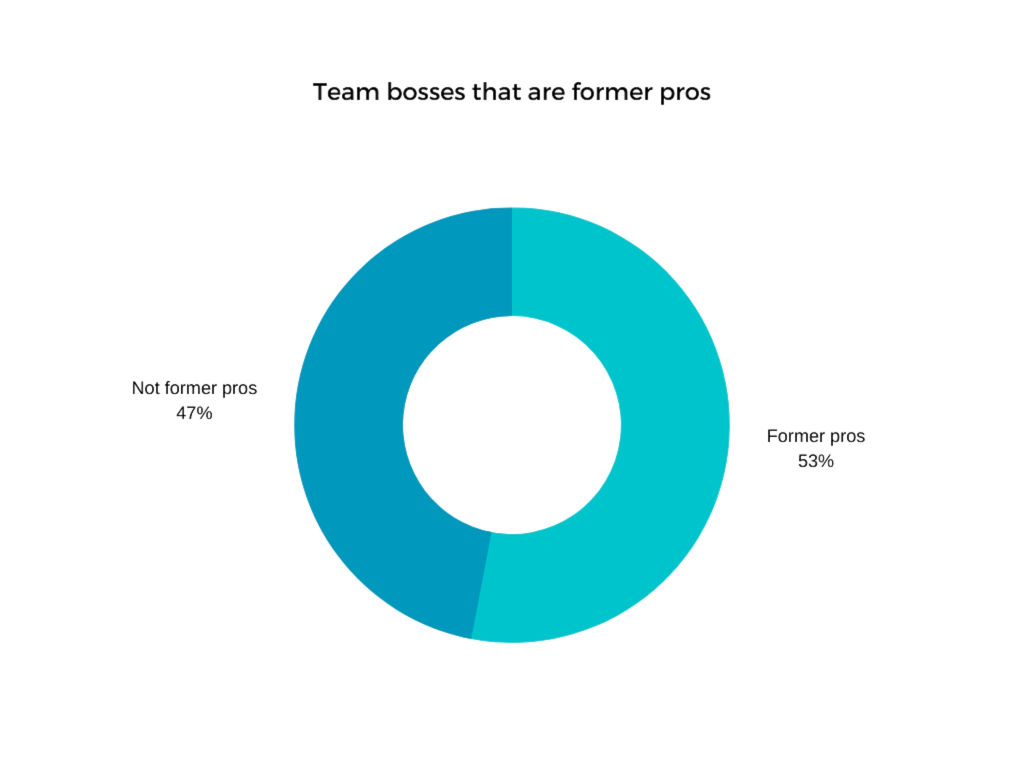
UAE Team Emirates
Who’s in charge?
Mauro Gianetti, 59, CEO and team principal of UAE Team Emirates, is a Swiss former professional cyclist with a career spanning 16 years that included victories at Liège-Bastogne-Liège, the Amstel Gold Race, and Milano-Torino. He was the general manager of the Saunier Duval team for its entire existence between 2004-2011. The team had a number of high-profile drug scandals, most notably a string of positive tests in 2007-2008 by star riders like Iban Mayo and Riccardo Ricco. Perhaps due to that, the outfit struggled to find sponsorship stability. In their final 2011 season as Geox-TMC, Juan José Cobo won the Vuelta for the team before having the title stripped from him in 2019 after being found guilty of doping.
In 2016, Gianetti emerged as the coordinator of the project to create the first Chinese WorldTour team when Lampre-Merida’s licence was up for grabs. When that avenue of funding fell through, alternate sponsorship was secured from the United Arab Emirates, with the Emirates airline signing on as naming sponsor.
Where does the money come from?
The Emirates airline is owned by the Emirates Group, a state-owned and Dubai-based aviation firm. It was founded in 1985 by Ahmed bin Saeed Al Maktoum, a member of Dubai’s ruling family. It is the world’s fourth-largest airline, with 75,000 employees and annual revenues of $15 billion and is owned by the UAE’s sovereign wealth fund, which has a reported $305 billion in total assets.
Owner of sponsor:
Emirates – The Government of the UAE (UAE)
What did you think of this story?
